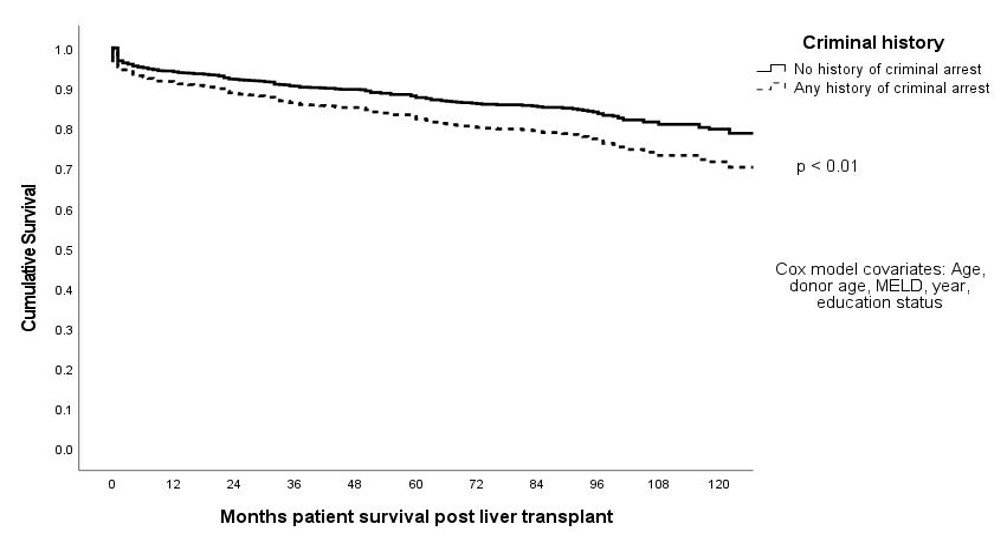Liver Transplant Recipient History of Criminality: Impact on Clinical Outcomes
M. M. French1, R. Mangus1, R. Holmes1, A. Krause1, J. Sumner1, C. Kubal1, B. Ekser2, P. Mihaylov3, A. Lutz4, J. Fridell5
1Department of Surgery, Indiana University, Indianapolis, IN, 2Surgery, Indiana University - Transplant Surgery, Indianapolis, IN, 3Department of Surgery, Indiana Univ School of Medicine, Indianapolis, IN, 4Department of Surgery, Indiana University, Fishers, IN, 5Department of Surgery, Indiana University School of Medicine, Indianapolis, IN
Meeting: 2022 American Transplant Congress
Abstract number: 1602
Keywords: Ethics, Liver transplantation, Outcome, Risk factors
Topic: Clinical Science » Ethics » 22 - Psychosocial and Treatment Adherence
Session Information
Session Name: Psychosocial and Treatment Adherence
Session Type: Poster Abstract
Date: Tuesday, June 7, 2022
Session Time: 7:00pm-8:00pm
 Presentation Time: 7:00pm-8:00pm
Presentation Time: 7:00pm-8:00pm
Location: Hynes Halls C & D
*Purpose: Health disparities are present in transplantation, just as in other areas of medicine. This is a retrospective review of liver transplant (LT) recipients to determine the impact of the history of criminality on early liver transplant outcomes and 10-year survival.
*Methods: The records of consecutive LT patients at a single center were reviewed (2010-2020). Bivariate and subgroup analysis explored criminality history differences in demographic and psychosocial factors. Cox regression was used to estimate survival.
*Results: There were 1297 subjects, 358 had any history of arrest (28%), 50 had a history of violent crime (4%) and 27 had a history of imprisonment greater than 6 months (2%). Demographic analysis demonstrated those with a history of criminality were less likely to be employed at time of LT (p<0.001), and were less educated (p<0.001). Among psychosocial factors, those with any history of arrest were more likely to have any history of mental illness, depression and anxiety (p<0.001 for all three). Subjects with a history of violent crime were more likely to have PTSD (p<0.001). Those with any history of arrest, imprisonment of greater than 6 months, and a history of violent crime were more likely to have a history of tobacco use, illicit drug use, and a history of alcohol use/abuse (p<0.001 for all). For clinical outcomes, subjects with a history of arrest had a shorter wait time to transplant (35 versus 53 days, p<0.01), but equivalent length of stay, early mortality and 1-year survival. Cox 10-year patient survival found significant differences between those with a criminal history versus those without any history of criminal activity when controlling for MELD, recipient and donor age, year of transplant, and education level (p<0.01).
*Conclusions: This study contains detailed demographic and psychosocial information of a large number of LT recipients. Cox 10-year patient survival demonstrated a significant decrease in those with a criminal history versus those without any history of criminal activity when controlling for MELD, recipient and donor age, year of transplant, and education level (p<0.01).
To cite this abstract in AMA style:
French MM, Mangus R, Holmes R, Krause A, Sumner J, Kubal C, Ekser B, Mihaylov P, Lutz A, Fridell J. Liver Transplant Recipient History of Criminality: Impact on Clinical Outcomes [abstract]. Am J Transplant. 2022; 22 (suppl 3). https://atcmeetingabstracts.com/abstract/liver-transplant-recipient-history-of-criminality-impact-on-clinical-outcomes/. Accessed February 27, 2026.« Back to 2022 American Transplant Congress

